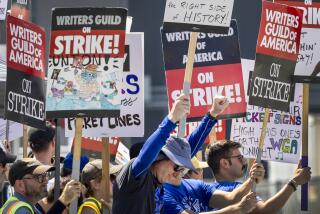Microsoft Trial Gets Bogged Down Amid Cross-Examination
The promise of a speedy antitrust trial for Microsoft Corp. and the government appeared to fade Wednesday as state lawyers moved to question witnesses separately from the Justice Department and as Microsoft’s cross-examination of the government’s star witness dragged on.
Many experts believe a lengthy trial would benefit Microsoft by allowing the software giant to press ahead with new technologies that could render moot the trial’s outcome.
On day three of the biggest business trial since the breakup of the AT&T; telephone monopoly, Microsoft’s lead attorney sought to deflect charges that the company offered to take over rival Netscape Communications Corp., by showing that the initial merger offer actually came from Netscape.
U.S. District Judge Thomas Penfield Jackson has vowed to hold a quick and efficient trial. He has limited each side to 12 witnesses and spurned a Microsoft request to delay the start of the landmark antitrust case for up to six months.
But New York Assistant Atty. Gen. Stephen D. Houck told Jackson that he will submit a request to conduct his own questioning of trial witnesses. Houck, who represents the District of Columbia and the 20 states that have joined in the Justice Department’s landmark antitrust suit against Microsoft, said they want their own opportunity to question witnesses, despite an earlier agreement among the parties that the government would have only one lawyer question each witness.
The trial appeared to further bog down as Microsoft lead lawyer John L. Warden continued his meticulous cross-examination of Netscape Chief Executive James Barksdale.
Barksdale, a 55-year-old former AT&T; executive whose folksy witness-stand rejoinders to Warden’s questions have provided the few moments of levity in the slow-moving trial, was pressed at length by Warden to explain such words as “market,” “browser” and “popular.”
Warden spent nearly 5 1/2 hours Wednesday going over Barksdale’s 126 pages of written testimony, paragraph by paragraph, in an attempt to rebut the government’s case.
The government’s lead lawyer, David Boies, opened the trial on Monday by painting Microsoft and its chairman, Bill Gates, as ruthless corporate predators who illegally use their Windows software monopoly to extend their dominance to the Internet and other emerging information technologies.
The painstaking cross-examination of Barksdale on Wednesday was aimed at countering a key government allegation that the government maintains symbolizes the way Microsoft does business.
The government claims that during a controversial June 21 meeting with Netscape, Microsoft made overtures to team up with its rival as part of a proposed scheme to illegally divide the red-hot market for Internet software. No such plan was ever agreed to in the end. But the government has sought to portray the meeting as evidence of Microsoft’s alleged anti-competitive conduct.
However, Microsoft maintained Wednesday that the meeting occurred merely in response to overtures initiated six months earlier by Netscape’s founder. As proof of that, Warden displayed a Dec. 29, 1994, e-mail message from Netscape co-founder and Chairman James Clark to a Microsoft executive suggesting the software giant “take an equity position in Netscape.”
“We want to make this company a success, but not at Microsoft’s expense,” Clark wrote in the e-mail.
Netscape’s lawyers characterized the e-mail message as a desperate plea from a man who was fearful that his company would soon run out of money and be forced to close. They said it was not an official invitation to Microsoft.
“I think he was a little nervous and looking for a new round of investment,” said Christine Varney, a former member of the Federal Trade Commission who is now advising Netscape as a private Washington lawyer. Varney noted that Clark stated at the end, “No one in my organization knows about this message.”
Microsoft spokesman Mark Murray said that due process and fairness demand that his company be given considerable time to question Barksdale since Barksdale is the government’s chief witness. He indicated that Warden’s cross-examination of Barksdale could go on much longer.
“Mr. Barksdale has spent the last 3 1/2 years lobbying the government to bring a case against Microsoft, so Microsoft is entitled to a detailed cross-examination of Mr. Barksdale,” Murray said.






